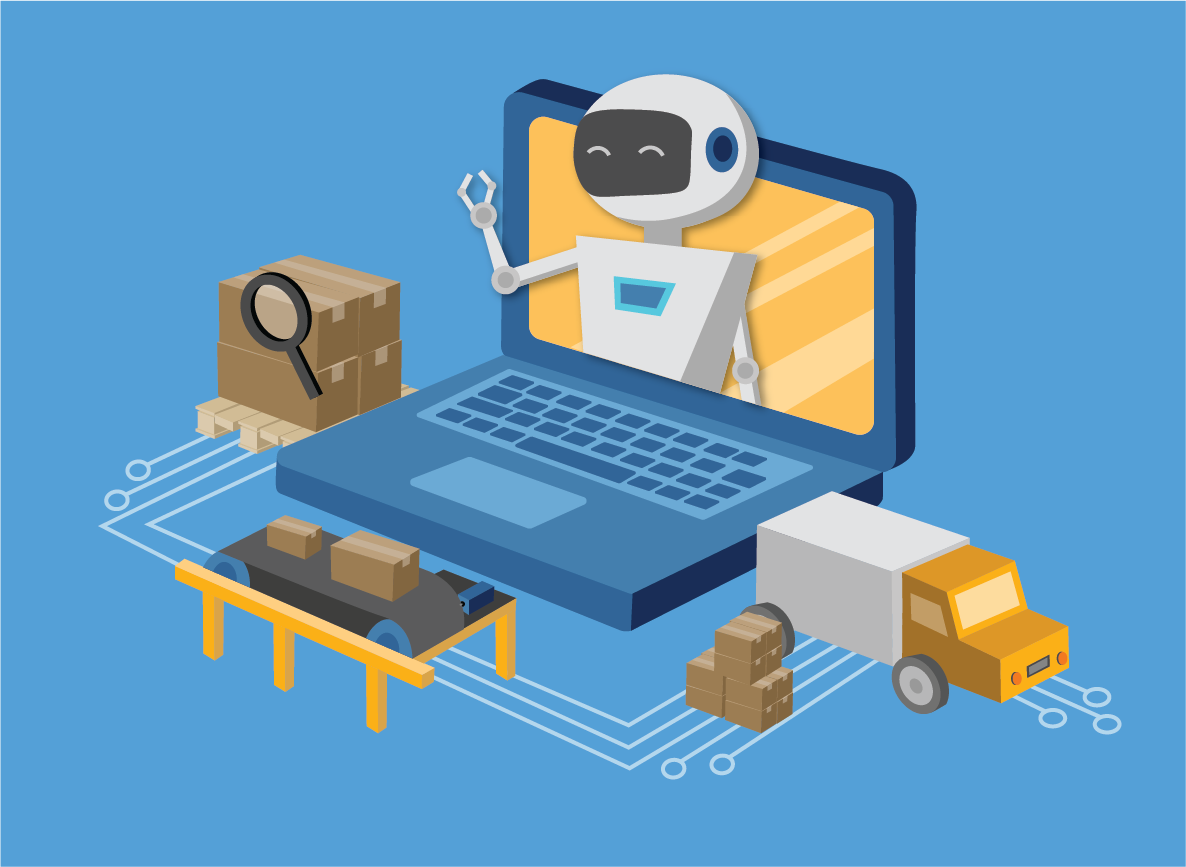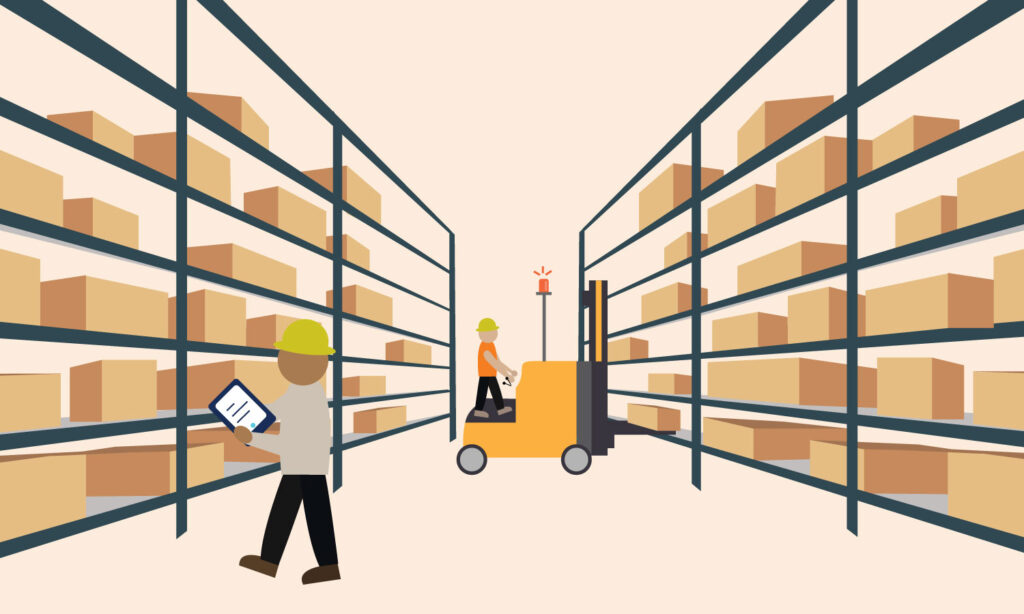In the age of technology, the message to customers and businesses everywhere is loud and clear: sky’s the limit. Supply chains are expected to operate effectively through natural disasters, pandemics, trade barriers, unforeseen factory shutdowns, and product recalls. AI inventory solutions create more powerful and adaptive supply chains.
In today’s fast-paced world, simple, reactive supply chains just won’t cut it. Supply chain managers need to be able to cut through the noise of massive amounts of data with a powerful tool. Is there a way for them to detect bottlenecks sooner? Leveraging the power of artificial intelligence (AI) and machine learning (ML) in your supply chain management seems to be the only way forward.
What is a Resilient Supply Chain?
Supply chains are more complex than ever before thanks to increasing globalization, shorter trend cycles, and inflation. Supply chain managers are now struggling to find ways to respond and adapt to disruptions in real time. In today’s world, a resilient supply chain is the difference between the success and the failure of your business.
Resilient supply chains are smarter and more responsive than traditional supply chains. They detect disruptions in real time and deploy the most effective solution. One of the key drivers of supply chain resilience is the use of artificial intelligence and machine learning algorithms in inventory management.
AI tools help businesses respond in times of crisis. Even more importantly, they help businesses strengthen supply chains before a disruption occurs.
How AI Creates More Resilient Supply Chains
Complete Visibility
Without strong visibility, businesses can’t maintain optimal inventory levels across their supply chains. This leads to high storage costs, lost sales, and unsatisfied customers.
AI makes use of the endless stream of data collected through inventory management devices and cloud-based applications. Companies use this data to map their supply chains from one end to the other. More visibility leads to increased efficiency and accuracy in logistics.
Demand Forecasting
As consumer behaviors become more complex, businesses need a way to detect or predict real-time changes in demand. Powerful inventory systems collect data at different points across the supply chain using barcode inventory software or POS integrations.
When businesses use AI technology to analyze demand signals, they’re able to improve the accuracy of demand forecasting. Sometimes AI technology and ML algorithms even discover new consumer habits. This makes it easier to optimize production and inventory plans, across multiple locations. In turn, businesses select the most cost-effective logistics solutions.
Optimized Inventory Management
Pairing AI technology with your inventory management solution optimizes operations across your entire supply chain. Track inventory levels through sourcing, manufacturing, and distributing to warehouse operations across multiple locations.
AI tools analyze multiple variables including lead times, carrying costs, and demand variability. This data determines the right amount of stock for businesses to keep on-hand. This ensures businesses reduce costs associated with excess inventory and lost sales from stockouts.
How Does Artificial Intelligence Fit Into Supply Chain Management?
AI has the potential to revolutionize supply chain operations. It’s quickly becoming essential to innovation in many industries. A recent McKinsey survey reports that companies have achieved the highest savings from AI in supply chain management. AI adds value by improving decision-making in supply chain planning from production to inventory management and product distribution.
AI technology can be costly in the beginning. However, early adopters in supply chain management agree that AI has consistently delivered a “strong ROI.” These companies have seen logistics costs reduced by 15 percent, on-hand inventory levels reduced by 35 percent, and service levels improved by 65 percent.
The consensus among many supply chain executives is that AI technologies are smart investments. They support a shift from simple reactive systems to predictive and adaptive learning systems that drive better business decisions. In fact, the majority of these supply chain executives agree that AI and cloud-based inventory systems will account for the biggest portion of their investments in digital operations over the next few years.
In today’s fast-paced and connected world, maximizing profits goes hand-in-hand with reducing uncertainty in your supply chain. AI has the ability to process and analyze huge amounts of data collected by systems like inventory management systems, ERP systems, CRM systems, and POS systems. By detecting patterns and quantifying tradeoffs at scale, AI tools dramatically reduce uncertainties in supply chains and improve contingency plans for when disruptions arise.
Stop struggling to maintain optimum inventory levels across your supply chain!
Talk to an Expert!
Supply Chain Challenges Solved by AI
One of the biggest challenges faced by supply chain companies is maintaining optimal stock levels. Avoiding lost sales from stockouts and high storage costs from overstocking is a significant challenge of inventory and warehouse management.
Effective inventory management requires accounting for multiple variables. Things like order fulfillment and replenishment, picking and packing, and shelf-life, must all be accurately tracked without taking up too much time. AI technology is able to handle larger amounts of data than traditional supply chain management software. Here are 4 ways AI solves challenges from one end of the supply chain to the other:
Use Cases
Manufacturing
A manufacturing company uses AI to optimize its inventory levels. It analyzes production schedules, lead times, and demand patterns. This ensures the company has enough raw materials on hand to meet production requirements without overstocking.
Supplier Management
AI helps businesses identify and mitigate risks in their supplier networks. It analyzes supplier performance data along with external factors like natural disasters. This way AI can help businesses make informed decisions about their suppliers.
Warehouse Management
AI optimizes warehouse operations by analyzing data collected with barcode scanners/RFID scanners on inventory levels, order volumes, and delivery schedules. This makes it easy to automate processes such as picking, packing, and shipping. As a result, companies reduce costly manual labor and improve overall efficiency by freeing up workers to focus on more complex tasks.
Supply Chain Visibility
AI provides businesses with real-time visibility into their supply chains. With a mobile inventory management system, businesses can continue to track inventory movements out in the field, which are analyzed by AI technology. For example, a food distributor uses AI to track the temperature of its perishable inventory during transit. Monitoring temperature data in real-time ensures that the company handles its products properly and maintains their quality.
Benefits of Adding AI Technology to Your Inventory Management System
Optimized Inventory Levels that Reduce Operations Costs
Clear Spider’s Inventory Management and Control System collects real-time data about lead times, carrying costs, demand variability, and inventory levels across multiple locations. Adding AI technology to analyze these factors makes it even easier for businesses to maintain the right amount of stock. From customer service to the warehouse, automated intelligent operations reduce dependency on manual efforts. Work error-free for longer durations to make operations faster, safer and smarter.
Data-Driven Forecasting that Enhances Decision Making
AI algorithms analyze large volumes of data to predict future demand more accurately. Clear Spider’s Vendor Managed Inventory (VMI) System provides suppliers and customers with real-time insights into inventory levels and supports a strategic partnership that maintains the correct flow of inventory across the supply chain. Integrate AI tools with your Clear Spider system to develop demand-driven solutions. Reduce safety stock levels and limit stockouts to help your supply chain respond quickly to changing market conditions.
Increased Warehousing Efficiency that Improves Customer Satisfaction
Clear Spider’s Warehouse Management System (WMS) streamlines warehouse operations by automating processes such as picking, packing, and shipping. This ultimately improves overall efficiency and reduces costs.
AI tools analyze and integrate larger volumes of data including customer demand, weather, and operational data. This enables your inventory management system to predict potential problems and alert transportation and logistics service personnel with recommended actions. With the right products always available at the right time, businesses report enhanced customer satisfaction and loyalty.
Clear Spider Makes Managing Inventory with AI Simple
Data Quality and Availability
AI algorithms rely on high-quality data to make accurate predictions. Clear Spider’s cloud-based system collects accurate, real-time inventory data that is accessible from anywhere, at any time.
Integration with Existing Systems
AI technologies need to be integrated with existing inventory management systems to draw on historical data and make better data-driven decisions. Clear Spider’s system is highly flexible, supporting limitless integrations with any software on the cloud.
Security and Privacy Concerns
AI systems may require access to sensitive data, such as customer information or proprietary business data. To ensure the security and privacy of this data, Clear Spider uses 256-bit SSL encryption – the same standards used for internet banking – to keep your data secure at all times.
Change Management
Implementing AI technologies often requires changes to existing processes and workflows. Clear Spider’s project managers work with clients directly to ensure that managing these changes and training staff to use the new technologies effectively is a smooth and efficient process.
The Future of Smart Supply Chains
AI has already begun playing a transformative role in inventory management, helping businesses optimize their supply chains and improve resilience. Many supply chain experts believe the level of automation in supply chain processes is going to double in the next five years.
Information that has previously been human-generated will likely be machine-generated – flowing out of barcode scanners, RFID tags, GPS and more. Maybe inventory will count itself, containers will detect their contents, and pallets will report if they end up in the wrong warehouse location.
As supply chains become more and more connected, supply chain decisions will become much smarter. Advanced analytics and modeling will start making decisions automatically, increasing supply chain responsiveness and limiting the need for human intervention. The evidence suggests that the use of Artificial Intelligence in supply chain management is here to stay.






